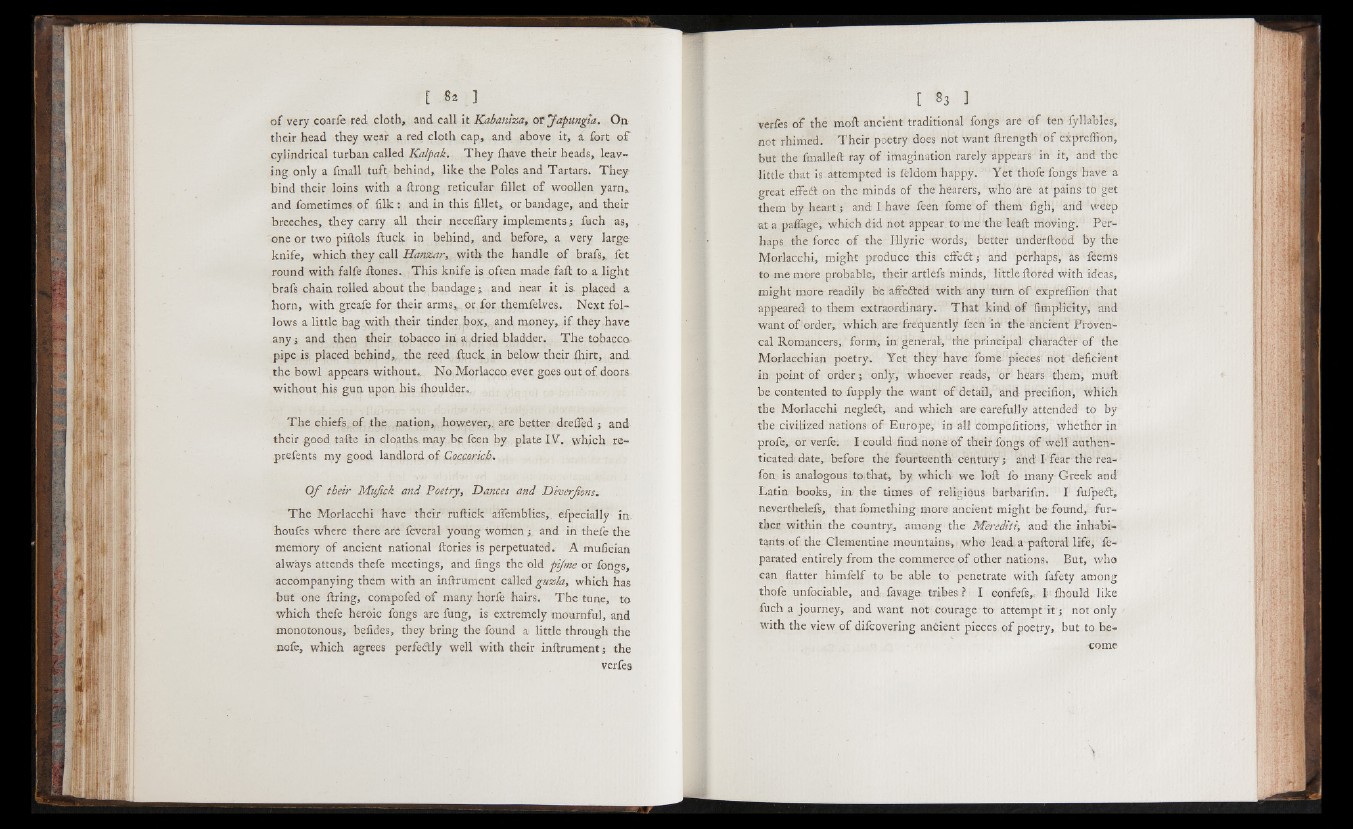
o f very coarfe red cloth, and call it Rabaniza, or Japungia. On
their head they wear a red cloth cap, and above it, a fort o f
cylindrical turban called Kalpak. They fhave their heads, leaving
only a fmall tuft behind, like the Poles and Tartars. They
bind their loins with a ftrong reticular fillet of woollen yarn,
and fometimes of filk : and in this fillet, or bandage, and their
breeches, they carry all their neceffary implements ; fuch as,
one or two piflols ftuck in behind, and before, a very large
knife, which they call Hanzar, with the handle o f brafs, fet
round with falfe ftones. This knife is often made fail to a light
brafs chain rolled about the: bandage; and near it is placed a
horn, with greafe for their arms, or for themfelves. Next follows
a little bag with their tinder box,, and money,, if they have
any ; and then their tobacco iri a, dried bladder. The tobacco-
pipe is placed behind, the reed ftuck in below their ihirt, and
the bowl appears without.. No Morlacco, ever, goes out of doors,
without his gun upon his fhoulder.
The chiefs of the nation, however, are better dreifed ; and
their good tafte in cloaths may be feen by plate IV. which re-
prefents my good landlord of Coccsrich,
O f their Mufick and Poetry, Dances and Diverfsns.
The Morlacchi have their ruftick affemblies, efpecially in.
houfes where there are feveral young women ; and in thefe the
memory o f ancient national itories is perpetuated. A mufieian
always attends thefe meetings, and fings the old pifme or fongs,
accompanying them with an inftrument called guzla, which has
but one firing, compofed o f many horfe hairs. The tune, to
which thefe heroic fongs are fung, is extremely mournful, and
monotonous, befides, they bring the found a little through the
nofe, which agrees perfectly well with their inftrument; the
verfes
verfes o f the moil ancient traditional fongs are o f ten fyllables,
not rhimed. Their poetry does not want ftrength o f expreffion,
but the fmalleft ray of imagination rarely appears in it, and the
little that is attempted is feldom happy. Ye t thofe fongs have a
great effedl on the minds of the hearer's, who are at pains to get
them by heart; and I have feen fome of them figh, and weep
at a paffage, which did not appear, to me the leaft moving'. Perhaps
the force o f the Illyric words, better underftobd by the
Morlacchi, might produce this effedl; and perhaps', as feems
to me more probable, their artlefs minds, little ftored with ideas,
might more readily be affedled with any turn o f expreffion that
appeared to them extraordinary. That kind o f fimplicity, and
want of order, which are frequently feen in the ancient’ Provencal
Romancers, form, in general, the principal charadter o f the
Morlaccbian poetry. Yet they have fome pieces not deficient
in point of order; only, whoever reads, or hears them, muft
be contented to fupply the want o f detail, and preeifion, which
the Morlacchi negledl, and which are carefully attended to by
the civilized nations o f Europe, in all competitions, whether in
prole, or verfe. i could find none o f their fongs o f well authenticated
date, before the fourteenth century; and’ I fear the rea-
fon is analogous to that, by which we loft ib many Greek and-
Latin, books, in. the times o f religious barbarifin. I fufpedt,
neverthelefs, that ibmething more ancient might be- found, further
within, the country, among the Merediti, and' the inhabitants,
of die Clementine mountains, who lead, a paftoral life, ie-
paraied entirely from the commerce o f other nations-. But, who
can flatter himfelf to be able to penetrate with fafety among
thofe unfociable, and- favage tribes ? I confefs,, ■ ffiould like
fuch a journey, and want not courage to attempt i t ; not only
with the view o f difcovering ancient pieces o f poetry, but to become